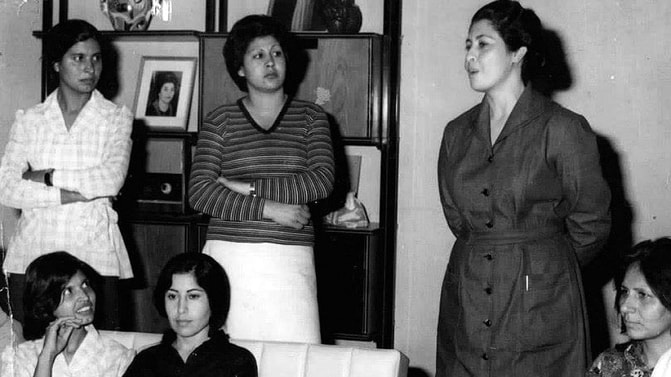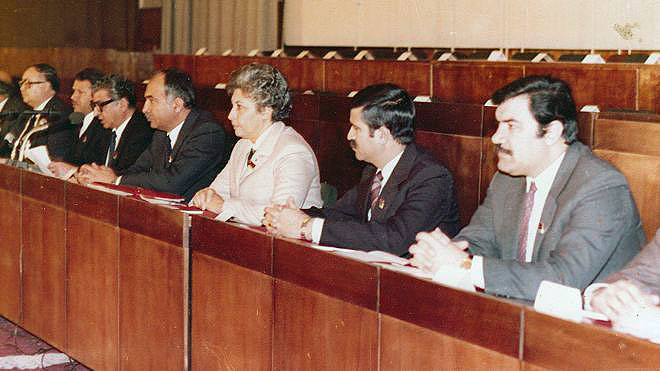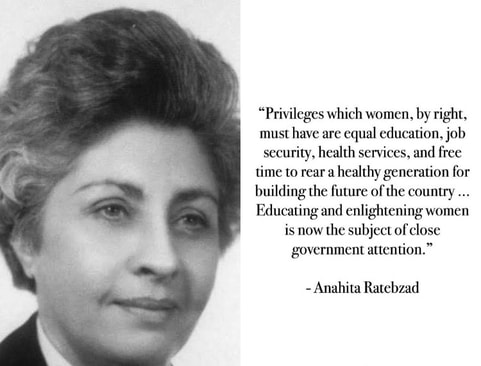|
8/20/2021 Remembering Anahita Ratebzad, socialist leader and mother of Afghan women’s liberation. By: Tim WheelerRead NowAnahita Ratebzad, standing at right, speaks with a group of activists. | Ratebzad Family via Twitter All the newspapers and television news programs right now are filled with stories about the dark future hanging over Afghan women and girls as the Taliban retakes control of their country. The Guardian late last week featured an article by an unnamed Afghan woman who said she is now hiding the two university degrees she earned, searching for a burqa to cover every inch of herself as the women-hating fundamentalists of the Taliban close in. She said she taught English language classes. “Every time I remember that my beautiful little girl students should stop their education and stay at their home, my tears fall…. As a woman, I feel like I am the victim of the political war that men started.” For over half the population of Afghanistan, the women, all the gains they have won could now be stripped from them. And for a large majority of men, they too will lose their democratic rights. We should not forget that the U.S. played a treacherous role in determining Afghanistan’s fate, sending in the CIA to arm the counter-revolutionary mujahideen to overthrow the progressive April Revolution back in the 1980s. Among the killers the CIA trained and equipped for these death squads was Osama bin Laden, ringleader in the Sept. 11, 2001, terrorist attacks on the World Trade Center and the Pentagon. It is also a good time to remember Anahita Ratebzad, the mother of Afghan women’s liberation, and to uphold the gender equality she fought so hard to achieve. When the April Revolution erupted in Afghanistan in 1978, Ratebzad was in the thick of the battle, a leader of the People’s Democratic Party. She wrote a famous polemic that appeared in the May 28, 1978, edition of New Kabul Times: “Privileges which women by right must have are equal education, job security, health services, and free time to rear a healthy generation for building the future of the country…. Educating and enlightening women is now the subject of close government attention.” When the April Revolution triumphed, the new prime minister, Nur Mohammad Turaki, named Ratebzad as Minister of Social Affairs. She was born in the village of Gildara, Kabul Province, on Nov. 1, 1931. Her father supported democratic reforms and was forced by the reactionary monarchist regime into exile in Iran. She saw little of her father as she grew up in poverty, attending a French-language school. She was forced to marry at age 15 to Dr. Keramuddin Kakar, one of the few foreign-educated Afghan men, a surgeon. She and her husband had three children, a daughter and two sons.
But in the years that followed, she was targeted for vicious defamation by Islamic fundamentalists for this bold initiative. Her husband, who supported Afghan monarch Zahir Khan, separated from Ratebzad. They remained separated, although they did not get divorced. Also in 1957, Ratebzad led a delegation of Afghan women to attend the Asian Conference on Women in Ceylon (Sri Lanka), the first time ever that Afghan women attended such a conference. By 1964, she had founded the Democratic Organization of Afghan Women, and on March 8, 1965, Ratebzad and other Afghan women organized the first ever march through Kabul in celebration of International Women’s Day. Ratebzad was also a reader, writer, and thinker. In the course of her political work, she became a Marxist-Leninist. She was one of four women elected to Afghanistan’s parliament in 1965 representing Kabul province—the first group of women legislators in the country’s history. Later, during the years of Afghanistan’s socialist revolution, she held several cabinet posts and also served as ambassador to Yugoslavia and Bulgaria at various times. From 1980 to 1985, she was Deputy Chair of the Revolutionary Council—the equivalent of vice president of Afghanistan. No woman before or since has held such a high position in the country.
Political pundits are spewing out a torrent of invective, “Who lost Afghanistan?” Washington and the media are full of finger-pointing. But there is scarcely a mention of Afghanistan’s April Revolution. And when it is mentioned at all, the government that led it is brushed aside as merely a “Soviet puppet.” Anahita Ratebzad was nobody’s puppet. She was a strong, independent woman, the face of a new Afghanistan. AuthorTim Wheeler estimates he has written 10,000 news reports, exposés, op-eds, and commentaries in his half-century as a journalist for the Worker, Daily World and People’s World. Tim also served as editor of the People’s Weekly World newspaper. He lives in Sequim, Wash., in the home he shared with his beloved late wife Joyce Wheeler. His book News for the 99% is a selection of his writings over the last 50 years representing a kind of history of the nation and the world from a working-class point of view. This article was produced by People's World. Archives August 2021
0 Comments
Leave a Reply. |
Details
Archives
July 2024
Categories
All
|



 RSS Feed
RSS Feed